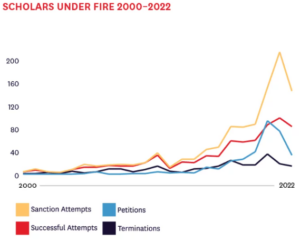Over the past 20 years or so, individuals and organizations both at an institution and outside have sought retribution against a scholar for something they said at an alarmingly increasing rate. In the last three years specifically, sanctions have exploded, according to a new report by the Foundation for Individual Rights in Education.
Scholars Under Fire: Attempts to Sanction Scholars from 2000 to 2022 discovered speech-related sanctions against scholars in the last 3 years (509) nearly equals the last 20 years (571). To put this in perspective, FIRE recorded four attempted sanctions in 2000 and 145 in 2022. Students, administrators, the general public, politicians and even other scholars are the most frequent entities to have waged 1,080 total sanctions since the turn of the century so far.
2021 experienced the highest amount of sanction attempts at 213, followed by last year at 145.
Almost two-thirds of attempts resulted in sanctions, including 225 terminations. The majority of these terminations involved untenured professors (73%). Harvard (12); the University of Central Florida (10); and Columbia, UCLA, and the University of Florida (9) have the highest rates of attempts successfully becoming sanctions.

More than half (52%) of sanction attempts are most likely to come from the left of the scholar’s political viewpoints, the majority of which are waged by undergraduate students. In fact, undergrads made 37% of the sanctions. However, censorship attempts coming from off-campus entities are most likely coming from the scholar’s right. For example, TurningPointUSA, a conservative advocacy group, waged 61 attempts in 2021 alone. Government officials responsible for their own censorship attempts are most likely conservative.
More from UB: Students are likely to rule out your school based on state politics
Why the backlash?
Political, race-related and gender-related expression surrounding major national headlines has catalyzed a surge of sanction attempts from 2016 onward. Following Trump’s election, 83 sanction bids in 2017 targeted a scholar’s speech on partisanship and conversations surrounding specific politicians. The ensuing #MeToo movement that year also fueled the fire, with shots at censorship focusing on gender-related expression. George Floyd’s murder in 2020 opened a storm drain of sanction attempts, all focused on race-related speech, which contributed to 2021’s record-high.
The prickliest topic a scholar can engage in is race, 39% of all sanction surrounded this. Institutional policy and partisanship made up the following biggest troublemakers. Less than 10% of all sanctions over the past two decades had to do with a professor engaging in contemptuous or malicious speech.
Scholars were the most wide-open to attacks on their first amendment in the classroom or conducting research. Specifically, more than four in 10 sanction attempts were in response to a scholar’s teaching practices and/or scientific inquiry.
“Cancel culture is particularly pernicious when it targets people charged with discovering and disseminating knowledge,” said FIRE Director of Faculty Outreach Komi Frey, lead author of the report. “Vocal, dogmatic minorities on the left and the right are trying to restrict the range of acceptable ideas in institutions of higher education, and this should alarm us all. You do not need to agree with a scholar’s teaching, research, or extramural speech to recognize that censorship is not the answer.”








